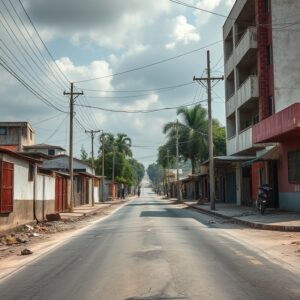Ibadan Stampede: Safety Concerns Spark National Debate

Illustration of an empty venue symbolizing the Ibadan stampede, highlighting the aftermath and the importance of better safety protocols.
On December 18, 2024, a nation was thrown into total shock and pain when, in Ibadan, Nigeria, a disaster occurred that ended a Christmas funfair meant to bring joy to the children in its worst possible stampede and killed 35 innocent children. Six others were seriously injured.
Organized by three individuals-ex-Queen Naomi Silekunola, formerly married to the Ooni of Ife, and another two influential people, Alhaji Oriyomi Hamzat, owner of Agidigbo FM, and Abdullahi Fasasi, principal of Islamic High School Bashorun-the event took place at the host’s school area. It was to be a time of celebration: 5,000 children in attendance were each to receive a gift of 5,000 naira, roughly $3.20, along with scholarships and free food.
What was supposed to be a time to spread joy quickly became a nightmare. Prechaotic, the atmosphere was one of excitement. It started very early in the morning, with children arriving as early as 5:00 AM, five whole hours before the scheduled start time.
More than 5,000 children were in attendance, awaiting activities that were billed as non-stop fun, but things began to go tragically wrong in the form of a fatal crush once the organizers began to arrive to start the event. LIVES LOST IN A SCENE OF UNIMAGINABLE HORROR.
Even though the cause of the stampede is still being investigated, its aftermath was swift and terrible. Ibadan medical facilities were filled with casualties. A hospital confirmed six casualties. Two out of them survived while the other four lost their lives.
A second medical facility reported three people who died as a result. The tragedy did not stop at the physical loss of life-it reverberated throughout the community and the nation, sparking outrage and deep sorrow. Following the disaster, eight people connected to the event were arrested.
This included Naomi Silekunola, the main organizer, along with Abdullahi Fasasi, the principal of the school. The Women In Need Of Guidance and Support Foundation, which had organized the event, came under strong public scrutiny.
With investigators trying to comprehend how such a thing could ever have happened, the spotlight was on them. It was such a serious incident that it drew the attention of President Bola Tinubu, who ordered a comprehensive investigation into the stampede.
His message was one of condolence to the families of the victims, but immediate justice was clear. The case was transferred to the Homicide Section of the State Criminal Investigation Department, which now becomes responsible for the investigation.
It is now left to the authorities to unravel this mess and find out what actually went wrong, and force those perpetrators to consequences. The Lagos State Governor Babajide Sanwo-Olu also sent his condolences to the Oyo State Governor Seyi Makinde and to the families who lost their loved ones.
Sorrow laced through his words, as he categorized the incident for what it is: nothing less than devastating. The sympathy, an overpouring as it was, also shared frustration—this was just so real that something terrible was something that could’ve been stopped in its tracks.
And here’s what really gets you thinking: How did this happen? Why let this tragedy be? Basic safety measures’ failure is what is at the heart of the devastation. Safety is supposed to be the concern in any event that occurs publicly, more so when events involve children.
Where was the proper planning? Where were the crowd control measures? And where were those emergency preparedness strategies that could save lives? These, of course, are the questions we should be asking, not as spectators, but as part of the nation that witnessed this tragedy.
The truth is, public safety in Nigeria, especially in events involving large crowds, often gets taken for granted. Organizers have thrown a couple of banners and have hired perhaps two security guards around the stage, thinking they’ve done enough. But Ibadan shows how that little line of thought would fail.
It’s not enough to simply show up and hand out gifts—there’s an obligation to ensure the safety and well-being of every single person attending, especially the children. Think about it for a second: We’ve all seen it.
People scramble to collect their free stuff during such events, and this creates a sense of urgency that can easily get out of hand very quickly. Poor crowd management, inefficiently managed entry and exit points, and sheer disorganization can easily fuel chaos.
Not a new trend at all, mind you. Whether it was concerts, festivals, or merely general public congregation, the cause of this stampede is just one of several that have characterised public gatherings all over Nigeria.
These are hard but important lessons: the first is that crowd control is of paramount importance. Organizers must prepare for the worst-case scenario and have emergency protocols in place. And not just written paper protocols—these measures need to be real, tangible, and tested.
There is no place for assumptions when human lives are at stake. The other key lesson that could be learned from this tragedy is that proper coordination between event organizers and security forces should be given paramount importance.
A few security agents standing around the periphery are not enough. They need to interact with the crowd. There must be some sort of order, and the movement of the crowd should always be monitored. This is a failure not just on the side of the event organizers but also of the law enforcement and local authorities to ensure that such a situation would not have happened in the first place.
Let us now zoom out a little and try to see the bigger picture. Yes, it occurred at a Christmas funfair and involved children. It is not that easy to sweep that under the carpet.
Bad news: The sad truth is this incident is no isolated case. It occurs far too often in Nigeria. We hear news of stampedes, fires, accidents at public events, among others. It does not just take the government, but the organizers themselves, the local authorities, among others, to see to it.
But it also makes a bigger call for cultural shift: accountability, proper planning-all of these factors become more germane. What it really all boils down to is that somebody has to account for the responsibilities, but it’s something that everybody has to take away from that.
We should take the lessons of Ibadan and lives lost there into every public event we hold in the future. Every one of us has a role to play. Whether you’re an attendee of public events or an organizer who plans them, we all must take safety seriously.
It is a call to action, and it is way overdue. We cannot wait any longer for yet another tragedy to strike before doing something about it. The issues at hand have nothing to do with whether the organizers were, or were not, negligent.
The question: what can be done by our nation to ensure something like this would never happen again? It is long overdue that we should begin having such a conversation.
Because as we’ve seen in Ibadan, the consequences of not taking safety seriously can be catastrophic. And if we’re being honest, it shouldn’t have taken 35 children losing their lives for us to start having this conversation in earnest.
This tragedy reminds one that, however noble an event may be, safety should come first. When it does not, the results are devastating, and no one should ever have to lose like that again.




